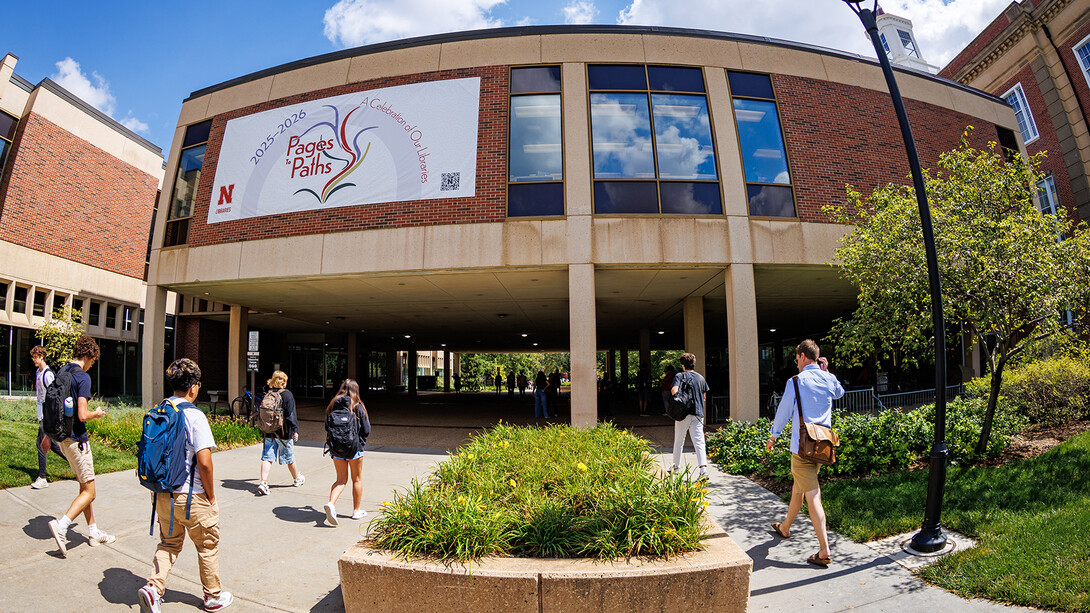
A pilot program led by the University Libraries is expanding access to no-cost or lower-cost course materials for thousands of Nebraska students — building on a program that has already saved more than $3 million since its launch.
The Libraries Course Materials program allows students to access textbooks and other materials through the Libraries’ collections, including e-books with unlimited user licenses. Last spring, Nebraska Today reported that the program had saved students $1.7 million. That total has since grown to more than $3 million.
To explore opportunities to scale the program, the Libraries launched a pilot study during the fall 2025 semester. Led by Melissa Gomis, chair of Collections Strategy and Open Scholarship, the study involved 18 instructors teaching 27 courses that had not previously used the program.
“There are several pathways for faculty to get their course materials for students,” Gomis said. “Because the current system is complicated, most faculty don’t have the time to investigate all the options to find the most affordable versions every semester.”
The Libraries team took on that comparison work — searching for assigned course materials across their collections, open educational resource repositories, and the university’s two Inclusive Access vendors, Unizin and Follett.
Of the 27 courses, only three already used the lowest-cost option. The remaining 24 could save students money by switching to Libraries-supported resources.
Courses in the pilot represented several colleges and disciplines:
- College of Arts and Sciences: 16 courses
- College of Business: 2
- College of Journalism and Mass Communications: 2
- College of Engineering: 2
- School of Criminology and Criminal Justice: 3
- College of Education and Human Sciences: 1
- Glenn Korff School of Music: 1
Across the 27 courses, 58 books were assigned. At the start of the pilot, none were available in the Libraries’ collections with unlimited licenses. During the study, the Libraries acquired many of these titles. Of the 58, 16 were also available through both IA platforms — 12 of which were less expensive through Unizin.
"The Libraries can batch or bulk search across our systems to find the lowest-cost items,” Gomis said. “Follett and Unizin are unable to do that, which is a challenge to scaling this process with IA."
The pilot also identified opportunities to recommend OER grants to faculty whose materials were not available through Libraries or IA. One instructor received a $1,000 Libraries Course Materials grant to convert a course to entirely no-cost materials.
Gomis noted that faculty were receptive to the options.
“Some instructors were enthusiastic and switched IA providers,” she said. “Others were cautious due to the opt-in model. A variety of course material options are beneficial for our campus.”
Amy Guevara, lecturer of vocal studies, said the program was instrumental in designing a new course. After submitting her syllabus and reading list, the Libraries located every resource she needed and uploaded them directly into Canvas.
“My students have immediate access to a large pool of materials — without having to purchase anything,” Guevara said. “The Libraries work not only made my preparation process more manageable but also greatly enhanced the learning experience for my students.”
Looking ahead, Liz Lorang, dean of Libraries, is optimistic about scaling the program.
“We imagine a future where the Libraries receives simple, accurate citations — a basic best practice of research and scholarship — for all course materials,” Lorang said. “That would enable us to provide significantly more reading materials at no or low cost to students, contributing to their retention and success.
“Our program is very attractive to donors. As long as we have funding, we can help make materials more affordable for Husker students.”
Faculty interested in exploring affordable options for spring 2026 can share syllabi or materials list with the Libraries Course Materials team. Progress can be tracked on the Libraries’ affordability dashboard.







